Do you want to find something in the water? Even though it seems like a simple task, there are many underwater metal detectors out there with different features and prices. To help you choose the best one for your needs, we have compiled a list of the top five devices on the market today. You will also find some helpful tips that can make all the difference when it comes to finding what you need quickly and easily!
Finding something in the water can be difficult without an underwater metal detector. It is hard to see what you are looking for, yet there could be many expensive items at the bottom of a pool or lake that go unnoticed because they blend into their surroundings. While choosing one may seem like a simple task, it’s not always easy to tell which models will stand up to your needs and make finding things easier on you. The best way to choose is by using some helpful tips along with our list of top rated devices!
Best Underwater Metal Detectors Reviews
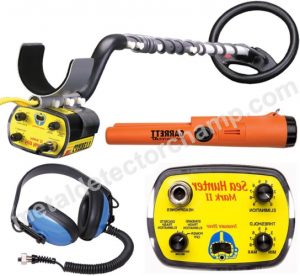
The Garrett Sea Hunter Mark II is one of the best underwater metal detectors currently available for purchase! It has a wide range of features that can be customized to suit nearly any individual’s needs.
In particular, it comes with an audio jack so users have access to headphones or waterproof speakers if they prefer not to use its built-in speaker instead which will improve detection capabilities dramatically too! Users are also given full control over its volume levels as well so it doesn’t get in the way of other activities while being used either.
There’s even more good news about this product because there are three different types of modes available on top of its standard all-metal mode including pinpointing targets individually without needing them to show up on screen first. The other two modes are for all-metal targets (fine) and discriminating between trash items like iron versus valuable finds like gold.
- Audio jack included to connect with headphones or waterproof speakers
- Three modes available that can be customized to suit any individual’s needs
- Only comes in one color (silver) so it might not fit your personal preferences if you are picky about what colors things have.
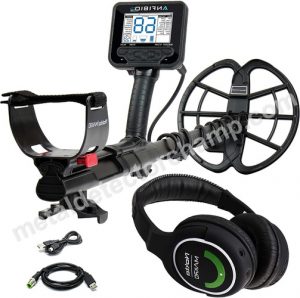
The Nokta Makro Anfibio 14 is a heavy-duty underwater metal detector! It has been tested time and again in the rainforest so it can definitely handle itself well against harsher weather conditions too.
This product comes with an audio jack included that allows users to use headphones or waterproof speakers if they prefer not to listen through its built-in speaker instead which will improve overall detection capabilities dramatically as a result. In addition, there are three different types of modes available including all metals mode (fine), digging only target mode, and discrimination between various metals mode.
Some of the most popular metal detectors are waterproof, but this model still has a lot to offer under water with an impressive detection depth up to 21 inches at its maximum! It is very lightweight for easy transport and comes equipped with both manual ground balance control as well as automatic pre-configured modes that make it great for beginners or experts alike. This device also comes standard with three different types of search coils available including DD 18×14 inch elliptical coil which increases your ability to pinpoint objects in deep places rather quickly.
- Detailed target analysis
- Great for both beginners and experts alike
- Lightweight & easy to transport
- Can be a bit pricey but worth the investment if your serious about finding treasures!
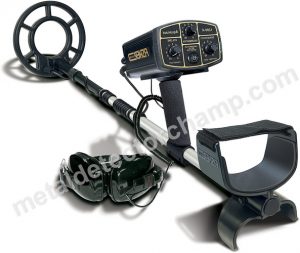
The Fisher 1280X-B is a good entry level detector for those who are just getting started in the hobby today! This product comes with an analog display and eight different levels of discrimination available. It features auto-tracking motion which allows you to adjust sensitivity based on ground conditions automatically or manually as needed.
In addition, there’s also both visual and audio target identification using its fully adjustable notch filter system that makes it simple to use even if your hearing isn’t what it used to be anymore either. There’s only ten preset search modes available and it weighs just under eleven pounds, making this a simple detector to use and carry around for long periods of time.
Also, you’re going to want one that’s waterproof so if you find yourself in an area where it might rain or be heavy with dew you won’t have any problems either! This device is fully submersible up to ten feet or three meters deep, so you can take it for a test drive in any conditions without worrying about the device malfunctioning too.
- An analog display
- Eight different levels of discrimination available and adjustable notch filter system
- Limited number of preset search modes only ten.
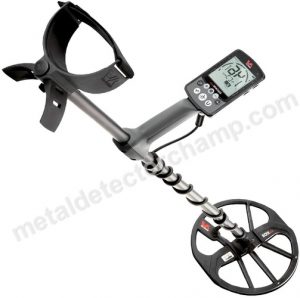
The Minelab Equinox 800 is a high-end metal detector but it’s still really easy to use! This device features automatic ground balance and has three different search modes available. It also includes an LCD display which makes working with this product easier than ever before.
It comes included with headphones too so you don’t have to worry about buying anything else, and its waterproof up to ten feet or three meters deep for added convenience as well. However, the only downside we could see of this machine would be that there isn’t any wireless connectivity available like some other similar products on the market.
The Minelab Equinox 800 is a high-end metal detector but it’s still really easy to use! This device features automatic ground balance and has three different search modes available. It also includes an LCD display which makes working with this product easier than ever before.
It comes included with headphones too so you don’t have to worry about buying anything else, and its waterproof up to ten feet or three meters deep for added convenience as well. However, the only downside we could see of this machine would be that there isn’t any wireless connectivity available like some other similar products on the market.
- Automatic ground balance
- Three different search modes available
- Headphones included for convenience and extra safety
- No wireless connectivity like some other similar products on the market.
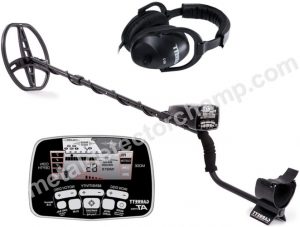
The Garrett AT Pro Metal Detector is also another great choice that features a lot of useful capabilities but it’s more affordable than the Minelab Equinox 800, so if you are looking to save some money this could be your best bet.
This product offers many different functions and abilities which makes working with it easy even for beginners who have little experience in metal detecting or underwater work. It has an impressive waterproof depth range up to ten feet or three meters deep just like our last pick, making them both really reliable choices for anyone interested! Additionally, all of its controls are very intuitive and come with LCD displays too which allow users to easily see their current settings while they’re working with it.
This metal detector features a fully automated digital target identification system that can detect between eight different types of metals and minerals, making the process a lot easier by eliminating all of those extra difficulties you have to deal with when trying to find objects underwater. It has an excellent discrimination mode which is great at separating unwanted signals from good ones so there’s no wasted time digging up trash or useless pieces of junk!
- Affordable
- Good waterproof depth of three meters or ten feet deep
- None
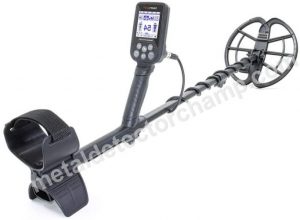
The Nokta Makro Simplex+ Underwater Metal Detector is another one of the best underwater metal detectors available on the market today. This product operates with two very different modes, so you can use it both above and below water for any situation! It has an impressive waterproof depth range up to twenty feet or six meters deep too which makes this unit perfect for anyone who’s interested in taking advantage of its portability.
The battery life goes a long way as well since it only requires three AA batteries to run. It has an amazing seven sensitivity modes, which provides you with the ability to choose just how much of a response you wish for it to give. The range is also excellent at up to ten inches or twenty-five centimeters in all metal mode and six inches or fifteen centimeters when using its discrimination feature.
This device will help you find your target easily too because it comes equipped with both audio tone ID modes as well as visual indicators so that you’ll be able to determine what exactly lies beneath the surface even while submerged! All in all, this is our number one pick out of the best underwater metal detectors on today’s market due entirely to its durability and functionality combined into one affordable package.
- Waterproof up to six meters
- Operates with two modes, so can be used both above and below water
- Battery life of only three AA batteries
- Seven sensitivity modes for more control over the search
- None!
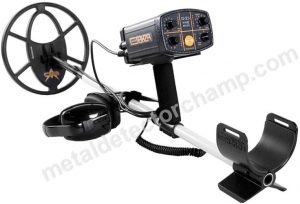
The Fisher CZ 21-866 is another excellent choice for those who are interested in finding the best underwater metal detector! This device has a waterproof depth range of thirty feet or ten meters which makes it perfect for scuba diving. In fact, this model was actually designed specifically to be used by professional divers and treasure hunters alike so that they can have access to more accurate information about what exactly lies beneath them while submerged.
It has an impressive discrimination control between three levels as well as four audio tones that help you determine just what kind of object you’re dealing with at any given moment too. This underwater metal detector has a maximum depth of up to three feet which is fairly impressive considering its price.
- Very popular choice for best underwater metal detector
- Can be used by professional divers and treasure hunters alike
- Offers accurate information about what is beneath you while submerged in water
- Doesn’t have a waterproof depth range of over thirty feet or ten meters so it may not be the absolute best option out there.
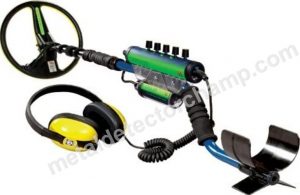
The Minelab Excalibur II is another fantastic choice that you should definitely consider if you’re searching for best underwater metal detector! This device has a waterproof depth range of ten meters or thirty feet and it actually comes with an amazing nineteen inch search coil.
It has a special feature known as All-Weather Performance (AWP) which means that not only can it be used in freshwater but also saltwater without any damage whatsoever to the electronics inside it. Not only does this make things easier on treasure hunters, but it’s also less expensive than having to purchase specialized equipment like what some other companies offer too.
When you purchase the Excalibur II, it’s important to understand that there are some accessories like headphones and batteries that aren’t included by default. With this device, you need four AA batteries which will last for approximately ten hours before needing replacement; this time frame can obviously vary depending on how often you’re using your metal detector . Also remember that if you plan to use headphones with the unit then a stereo headphone adapter is going to be required as well.
- Waterproof to ten meters or thirty feet.
- AWP means it can be used in freshwater and saltwater without damage.
- Not as expensive as some other companies’ products with similar features.
- Accessories like headphones are not included by default.
How to Choose The Best Underwater Metal Detector: A Buying Guide
When you’re looking for a waterproof metal detector, there are many factors that can help you narrow down your search. The first is the material of the device itself. Most underwater detectors come with a plastic or aluminum cover so they can withstand being submerged in water without breaking.
Some models have an adjustable design so that they will be able to fit easily onto different users and switching between dry land and water use as needed! There are also some devices on our list that offer multiple screens depending on what settings you choose, which makes it easier to read even when under water if desired.
In addition, these products usually have built-in data collection programs such as GPS tracking tools and mapping capabilities to make finding items faster than ever before!
A traditional metal detector is not waterproof and will stop working if it comes in contact with water. While there are some devices on our list that may be used both above and below the surface of water, these models can be more expensive than those meant for use exclusively underwater!
Underwater metal detectors also have different detection methods that allow them to find items easier than ever before. A majority of devices come with discriminating modes so that they only pick up what you want to find instead of cluttering your results with other signals from surrounding objects. This allows users to quickly locate their desired item without wasting time digging through soil or sand filled with junk metals like nails or screws!
When looking for an underwater metal detector, you will need to consider whether or not it is waterproof. This information can usually be found in the product description if it is included with your purchase! If there isn’t any specific details listed on this feature, simply check out some customer reviews and look at pictures of the device online which may show its water resistance level more clearly than manufacturer descriptions alone.
If you are only planning to use your tool above ground but want something that can also work under water as well, there are models available on our list so keep reading! Otherwise, you will need to choose between devices meant for land-based activities versus those made specifically for hunting below the surface of bodies of water!
Water is much denser than air, which can lead to some problems for metal detectors trying to detect metals under the surface. To compensate for this difference in density, pulse induction models are usually able to reach deeper depths of up to 200 feet or more!
Very low frequency devices may not be as strong when it comes to reaching maximum depth tolerances because they rely on slow moving signals that have a hard time traveling through water at extreme speeds. In most cases you should expect your device’s capable range from anywhere between 20 and 60 feet below sea level depending on its power levels and technology type used.
When you are looking for an underwater metal detector, one of the first things to consider is how big your coil will be! This refers to the circular shape at the end of your device that emits electromagnetic waves and senses where they bounce back.
Smaller coils can give better precision than their larger counterparts because there’s less surface area for them to cover which improves accuracy overall. The downside with this type is it can take longer periods of time before users manage to sweep over large enough areas in order to pinpoint what they’re searching for especially if deep soil or sand conditions exist below ground level. If yours has a smaller diameter, try taking faster passes across obvious targets instead so you don’t miss anything important!
Larger coils cover a larger circumference around the end of your device that emits electromagnetic waves which means they can be much faster when it comes to searching over large areas. However, this is not always an advantage because users may find themselves missing out on smaller objects in their path if they don’t check thoroughly enough!
If you plan on hunting for trinkets and other small items but still want something with good depth detection capabilities, we suggest looking at models equipped with mid-sized coils instead so you get the best of both worlds without having to compromise too heavily either way.
Lastly, when you are looking for an underwater metal detector consider its frequency range. This refers to the width of electromagnetic waves it can send out and receive back from nearby objects around your targeted area!
Lower frequencies tend to be weaker than higher ones which means they will have a hard time penetrating dense materials such as dirt or wet sand. As a result, pulse induction devices typically use much higher frequencies in order to produce stronger signals so their technology is better at detecting metals buried under thick layers of soil conditions even if there’s not deep standing water surrounding them like lakes or ponds! On the other hand very low frequency detectors might struggle with this problem because their slow moving radio waves cannot travel through deep soil fast enough unless large structures like boats exist to help them along.
Lastly, there is a filter that can be found on many underwater metal detectors. This helps to reduce the amount of mineralization interference which will improve detection capabilities overall! When you are looking for an underwater metal detector make sure it has one attached if it doesn’t already come with this helpful feature because otherwise soil conditions might seriously affect what your device picks up and where!
When you are looking for an underwater metal detector, one of the last things to consider is your control interface. This refers to how you will be able to access its various functions and adjust them when necessary!
There are a few different types available including push buttons which can give users more precise controls over their device but require them to enter in multiple commands before being able to do anything else. Some have touch-sensitive screens that allow instant customization so it’s much easier for beginners who don’t know what they want from their machine yet without needing any previous experience with similar devices beforehand.
If you are interested in an underwater metal detector that has audio support, this will allow its user to hear the difference between various targets including ferrous metals which sound different than non-ferrous ones. If yours doesn’t have one built into it, don’t panic! Many devices can be hooked up directly with headphones or waterproof speakers so users won’t miss out on anything important even if they do prefer not to use their ears for this feature instead!
Types of Technology Used for Underwater Metal Detectors
- Pulse Induction Detection
Pulse Induction Detection is the most common method of underwater metal detection. Pulse induction was originally used in military applications to detect landmines, but has since been applied to consumer uses for finding items under water!
This technology sends out low-frequency waves that are transmitted through any object it comes into contact with including soil, sand, and even bodies of water! When these signals hit an item they produce a pulse which triggers your detector if there is something close by on the same frequency as what you’re looking for. This allows users to find specific kinds of metals at pinpoint accuracy without wasting time digging up multiple worthless objects first.
- Very Low Frequency Detection
Very low frequency technology can be used in underwater metal detectors, but is much less common than pulse induction. This method sends out electromagnetic waves that move at a very slow speed so they remain in the same location for much longer periods of time!
This type of device works best when there are large pieces of land or other structures such as boats surrounding you because it has trouble detecting metals when they sink too deeply into the water’s surface. If your goal is to find items on dry land instead, this could be a good choice if Pulse Induction Detection would not work well due to shallow soil conditions.
Tips for Using an Underwater Metal Detector
- Don’t forget to turn on your underwater metal detector before going out into the water!
- Bring a friend along with you for extra help if necessary.
- Stay as calm and steady as possible when using this device so it doesn’t move around too much or lose track of where you are in relation to its targeted area.
- Try not to use an underwater metal detector near objects such as rocks or tree branches because they might interfere with what this device is trying so detect instead causing more confusion than anything else.
- When using one don’t just rely on it entirely without doing any previous research about what types of metals exist in your surroundings beforehand either! Answering these questions will improve overall results by leaps and bounds once you start using this device.
- Don’t try to go too deep either! Stay as close to the surface as you can instead and your experience will be much more pleasant overall because of it!
- Make sure that there is a warranty included with an underwater metal detector before buying one so if something does happen, you know they have got your back no matter what happens next!
Frequently Asked Questions
Conclusion
If you are looking to buy an underwater metal detector, then this is the blog post for you. We have compiled research on how different types of technology work and what features they offer so that you can make a well-informed purchase decision. Our article also provides information on which type of metal detection best fits your needs, as well as tips for using it more effectively in water situations. Finally, we answer FAQs about these detectors to help clear up any confusion. To find out which underwater metal detector is perfect for your situation (and budget), keep reading!